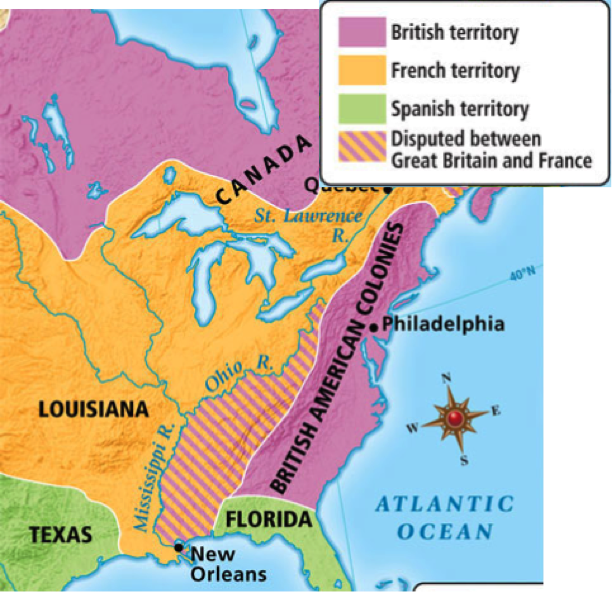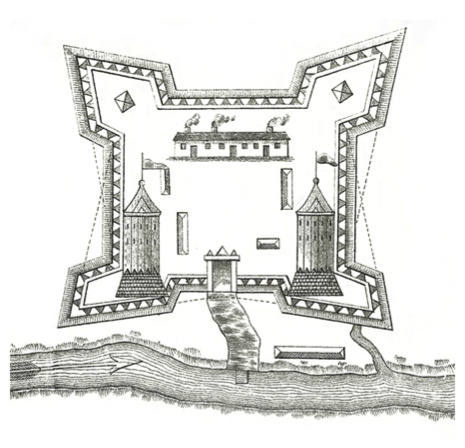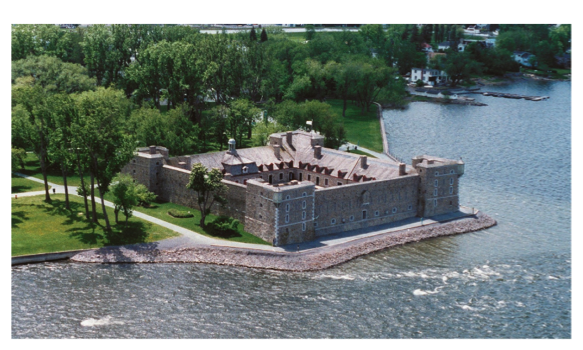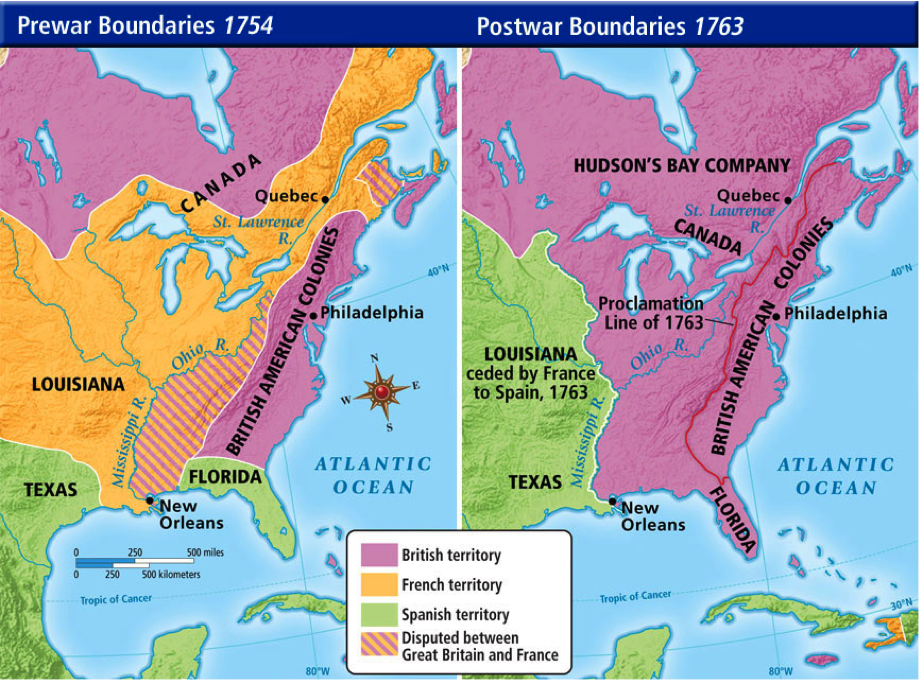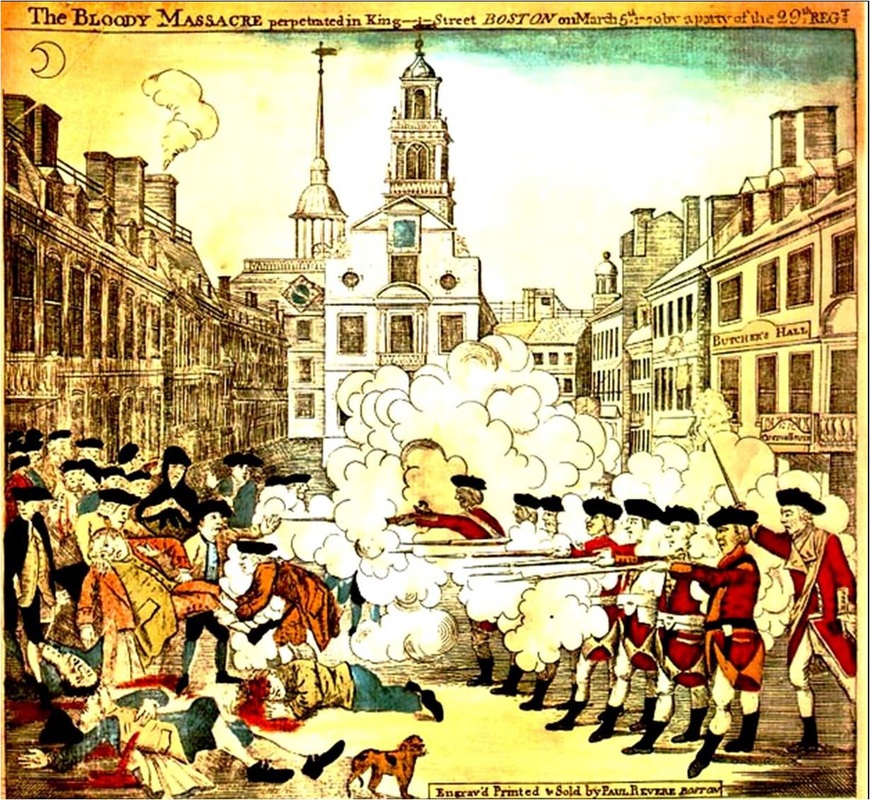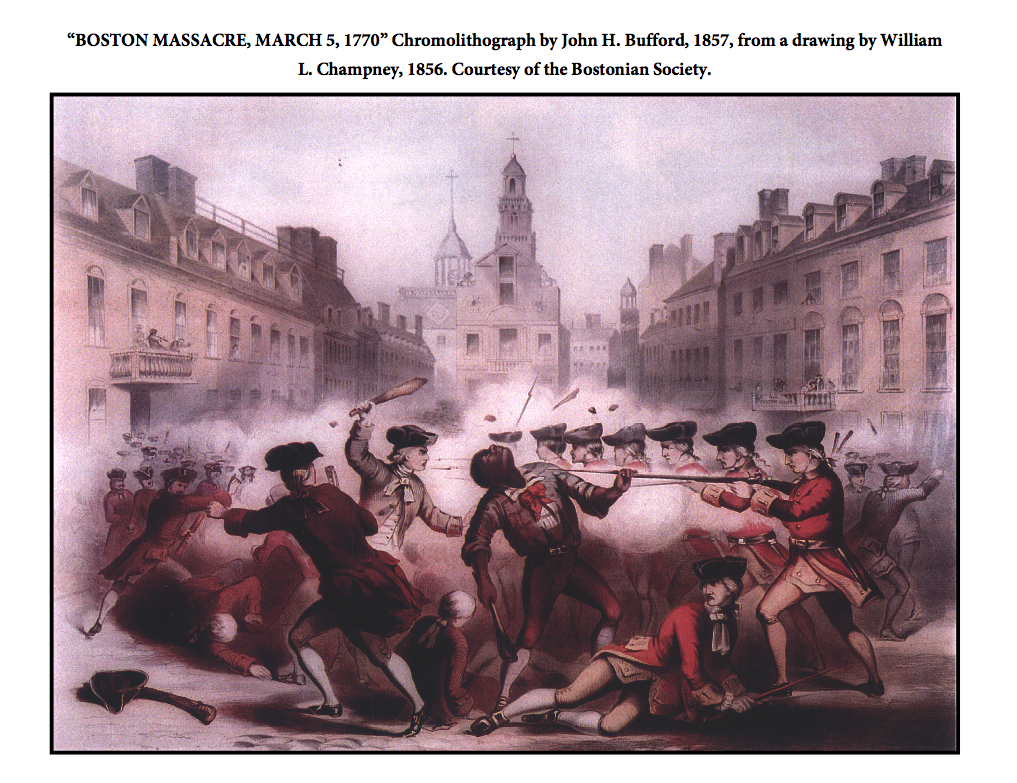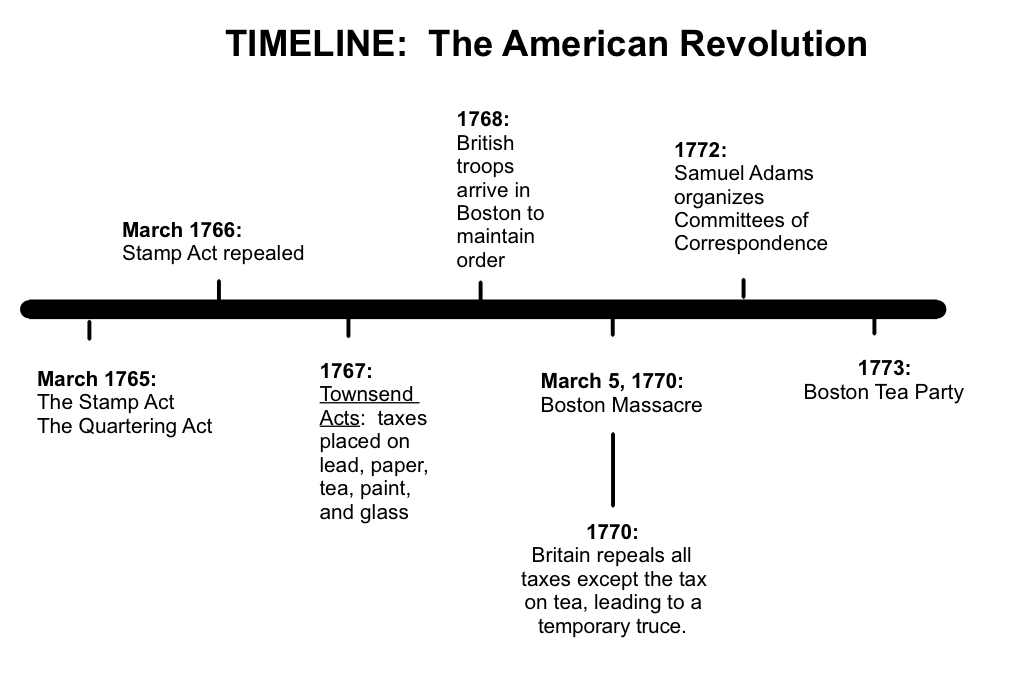the french and indian war
|
Causes of the War The French and Indian War from 1754-1763 was a conflict between Great Britain and France over their territorial possessions (land) in North America. Both countries wanted control of the Ohio River Valley because of the profitable fur trade. The two countries could not agree on their boundaries. The British claimed land along the Atlantic Coast to the Appalachian Mountains. The French settlements were north of the British colonies along the Saint Lawrence River and the Great Lakes and southward to the Mississippi River. Both claimed the land between the Appalachian Mountains and the Mississippi River known as the Ohio River Valley. Both countries wanted to reap economic benefits of the profitable fur trading and were willing to fight for control of North America. |
Battles
To secure their hold on the land, the French built forts (military buildings created so that it is protected from attacks) along the St. Lawrence River and the Great Lakes to keep away the British fur traders and settlers. The British set out to capture the French forts and to drive the French from the North American continent. Both the British and French had the support of the Native Americans and the troops from their home countries in fighting for control of the land.
The American colonists joined with the British to drive out the French. As a young twenty-two year old Major in the Virginia Militia, George Washington led colonial troops to force the French troops to withdraw from their forts along the Allegheny River. Washington’s troops were attacked and defeated at Ft. Duquesne in present-day Pittsburgh, Pennsylvania. This was the first battle of the war.
The most significant battle of the French and Indian War was fought in Canada. The fort at Quebec was the main fortress for France because it supplied all of the other French forts in colonial America. The British knew that if they captured Quebec, they would win the war. In early 1759, British General James Wolfe laid siege to Quebec with 9,000 soldiers. When the French surrendered, this was the turning point of the war. Now the British would soon control all of North America.
To secure their hold on the land, the French built forts (military buildings created so that it is protected from attacks) along the St. Lawrence River and the Great Lakes to keep away the British fur traders and settlers. The British set out to capture the French forts and to drive the French from the North American continent. Both the British and French had the support of the Native Americans and the troops from their home countries in fighting for control of the land.
The American colonists joined with the British to drive out the French. As a young twenty-two year old Major in the Virginia Militia, George Washington led colonial troops to force the French troops to withdraw from their forts along the Allegheny River. Washington’s troops were attacked and defeated at Ft. Duquesne in present-day Pittsburgh, Pennsylvania. This was the first battle of the war.
The most significant battle of the French and Indian War was fought in Canada. The fort at Quebec was the main fortress for France because it supplied all of the other French forts in colonial America. The British knew that if they captured Quebec, they would win the war. In early 1759, British General James Wolfe laid siege to Quebec with 9,000 soldiers. When the French surrendered, this was the turning point of the war. Now the British would soon control all of North America.
Results of the French and Indian War
The Treaty of Paris in 1763 ended the French and Indian War between Great Britain and France. France ceded (gave up) its territory in North America (including Canada) to Great Britain. Spain ceded Florida to Britain and in return received the lands west of the Mississippi River.
The end of the French and Indian War, however, resulted in a large debt that the British Parliament decided would be repaid by imposing higher taxes on the American colonies. The British felt the colonists benefited the most from the war and should help pay for the war debt. It is evident that conditions arising from the French and Indian War helped set the stage for the colonial revolt against the British and is considered the first step of the American Revolution.
problems britain faced after the french and indian war
|
Problem 1: Western Lands
After the French and Indian War, Britain a lot of new territory in North America and Canada. When Britain began to plan for what to do with this new land, they were faced with several problems. This is because there were many competing people who wanted to use it. Below are some examples: 1. Britain had to decide whether and what lands had to set aside for sale, for farming, and for hunting. 2. Pennsylvania and Virginia were arguing over the newly acquired land. 3. British land companies and colonial companies were competing with each other over the land. 4. American Indians had some claims to the land because of treaties they had signed with England during the French and Indian War. Possible Solutions 1. Put several regiments (a permanent army) of British troops in the colonies to defend them against the French and the American Indians. 2. Temporarily close Western lands until more solid plans were decided. 3. Allow settlers to move west at their own risk without defending them against the American Indians. |
Problem 2: Finances
Britain in London estimated that 10,000 British soldiers would be needed to defend the colonists from American Indians and a possible French attack. The cost of maintaining such a large army would be £300,000 per year. The British thought the colonists should help pay for the cost of their own protection. Furthermore, the French and Indian War had cost Britain £70,000,000 and doubled their national debt to £140,000,000. Compared to this, the colonists’ debt was extremely light, as was their taxes. The colonists paid only about 1/20th of the taxes that were paid by the British living in England. Attempts to raise taxes in Britain had resulted in riots. Taxpayers in England thought it was about time that the colonists pay their fair share. The colonists saw no reason for paying England to fight a war to keep them in the British Empire. They had never paid direct taxes to England, and had no intention of paying for a war they claimed they hadn’t started and didn’t need, especially since they had no say in the government. Possible Solutions 1. Increase taxes on people living in England. 2. Put taxes on articles of everyday use on people living in the colonies. 3. Have colonists pay the same taxes as people living in England. |
Problem 3: Trade Regulations
Even though the colonists were expected to obey the mercantile (trade) laws that regulated (controlled) their trade with England, they frequently avoided the laws and the tariffs (taxes) required at the ports. In fact, many colonists smuggled (move products illegally) goods into the colonies so often that it became a way of life for many American merchants. Britain lost a lot of money because of this smuggling. In American, Britain collected less than £2,000 per year although it cost FOUR TIMES more that amount to serve them. The British estimated that goods totaling around £700,000 each year were imported illegally by colonists. The reason why there was so much smuggling was because the British officials at customs were usually inefficient or corrupt. They accepted bribes rather than collect the money due to the King. Those who were caught smuggling were put on trial, but they would be judged by a jury of their peers, who did not believe that smuggling was a crime. Possible Solutions: 1. Pass strong laws to enforce existing trade regulations (for example, eliminate jury trial for people accused of smuggling and eliminate the need for search warrants) 2. Repeal (take away) all trade regulations. 3. Allow smuggling to continue |
Actual Decisions
In order to solve his problems, the King decided to do the following:
In order to solve his problems, the King decided to do the following:
- Passed the Proclamation of 1763, which prohibited colonists from settling west of the Appalachian Mountains or from purchasing lands in that area. All who were settled there were ordered to return it. Land would be reserved for Indians until the British decided on a more permanent solution.
- Britain decided to station 10,000 solders in North America to protect the colonists. The Quartering Act provided that colonists help support troops by supplying living quarters, candles, and rum.
- Passed the Sugar Act, which lowered the tax on molasses (in the hopes of reducing smuggling) and they passed the Stamp Act, which taxes paper goods.
- Writs of Assistance gave customs agents the right to search for smuggled goods without a search warrant
- Colonists accused of smuggling could be tried before a judge rather than a jury.
Click on the link below if you want to read the words from the Proclamation of 1783.
| Proclamation of 1783.doc | |
| File Size: | 35 kb |
| File Type: | doc |
colonist reactions to taxes
Your browser does not support viewing this document. Click here to download the document.
depictions of the boston massacre
Click on the icon below to read primary accounts of the event!
| Boston Massacre Documents.doc | |
| File Size: | 64 kb |
| File Type: | doc |
boston tea party
Click on this website to read about what happened during the Boston Tea Party!
In order to punish Boston for the Boston Tea Party, King George III passed a series of new laws that the colonists called “Intolerable Acts” or the “Coercive Acts.” These new laws:
In order to punish Boston for the Boston Tea Party, King George III passed a series of new laws that the colonists called “Intolerable Acts” or the “Coercive Acts.” These new laws:
- Closed Boston Harbor until it paid for all the damaged tea
- Banned town meetings
- Increased authority of the British governor
- Allowed British troops to be tried outside Massachusetts for crimes of murder
patriot & Loyalist arguments
Read both viewpoints below. Can you tell which one is a Patriot and which one is a Loyalist?
What are each of their reasons for either wanting or not wanting independence from Britain?
What are each of their reasons for either wanting or not wanting independence from Britain?
|
Viewpoint 1
British abuses and oppression[1] of the American colonies have escalated to the point of no return. For reasons of both honor and practicality, the colonies should abandon efforts toward reconciliation[2] and immediately declare their independence from the mother country. Since the early 1760s, [England] has initiated one crisis after another, each seemingly more insulting and destructive of colonial interests than the last. The Stamp Act of 1765, which dared to tax us without our consent[3], was the first serious breach[4] of trust between the two peoples. Parliament wisely repealed[5] it in the following year…but there then followed the Townshend duties, the Boston Massacre, the Tea Act, [and] the Coercive [Intolerable] Acts designed to cripple Boston…. Insults, abuses, betrayal, aggression, and bloodshed, then, … justify the growing American desire to separate from Britain. [….] We cannot help but recognize that we will be better off for doing it; for independence will bring us certain benefits, both immediate and long-term. Regarding the long-term benefits of independence, there is first the fact that Americans will be able to decide their own fate. No longer will American merchants and landowners wriggle helplessly under the thumbs of Parliament and the King. [….] We say that the only power we should feel obliged to recognize above ourselves is God Almighty! American independence will also forever put an end to the threat and reality of taxation without representation. […] America will no longer be bound to support British wars and alliances, but instead will have the right to pick and choose the nations with whom it wishes to be friends. Finally, it is essential that we Americans declare our independence now, rather than delay and end up saddling our children or grandchildren with the task. For make no mistake about it: An independent America is inevitable! [Loyalists] fail to see the plain truth that Britain is too far away and too detached from our interests to rule us effectively any longer. This is simple matter of common sense. For these reasons, America must be free and independent, a noble goal [that many Americans] have pledged to seek, support, and defend “to the last drop of their blood, and the last farthing of their treasure.” [1] oppression: cruel or unjust treatment [2] reconciliation: the restoration of friendly relations; to make peace [3] consent: permission [4] breach: break; betrayal [5] repealed: to get rid of; to take back |
Viewpoint 2
Under no circumstances should the American colonies declare independence from the mother country. Instead, we should reconcile our differences with and remain loyal to the land that brought us into existence, nurtured us, and continues to protect us from hostile forces … in the world. The proper course of action is twofold: first, to remain steadfastly loyal to our land of origin and offer no support whatever to the lawless agitators [Patriots & Sons of Liberty] among us; and second, to seek reconciliation[1] with the mother country…. Loyalty to the mother country, though first in importance, is not the only reason for refraining[2] from a split with Britain, there being practical reasons as well. The British have, it is true, made their own share of mistakes and causes a certain amount of ill will and havoc in the colonies in recent years. But these mistakes and the relatively small harm done … does not warrant[3] a split between parent and child, and our differences can easily be reconciled by calm discussion and negotiation. The advantages of such reconciliation are obvious and many. First, no more lives would be lost needlessly in altercations[4]…. Second, “By a connection with Great Britain, our trade would still have the protection of the greatest naval[5] power in the world…. The protection of our trade, while connected with Britain, will not cost us a fiftieth part of what it must cost were we ourselves to raise a naval force sufficient for the purpose.” Moreover…once we have reconciled with the mother country, within a few years…immigrants will again begin to arrive from different parts of Europe, swelling our local populations, raising the values of our lands, and increasing prosperity[6] overall. Another reason for maintaining our ties with Britain…is that the American colonists are Englishmen by temperament[7] and tradition, and therefore are not suited to assuming a new identity and rules themselves …. Moreover, they lack the money and resources to do so. There is a huge risk for our future and well-being if we try to start a war with Britain for independence, and we might not be able to survive on our own. We have never tried to run our own government, and we may not even know how to design one. Independence could be a very, very bad idea for us. [1] reconciliation: the restoration of friendly relations; to make peace [2] refraining: stopping oneself [3] warrant: justify [4] altercations: arguments or disagreements [5] naval: relating to a navy, which is an army that fights on the sea [6] prosperity: happiness [7] temperament: personality |
